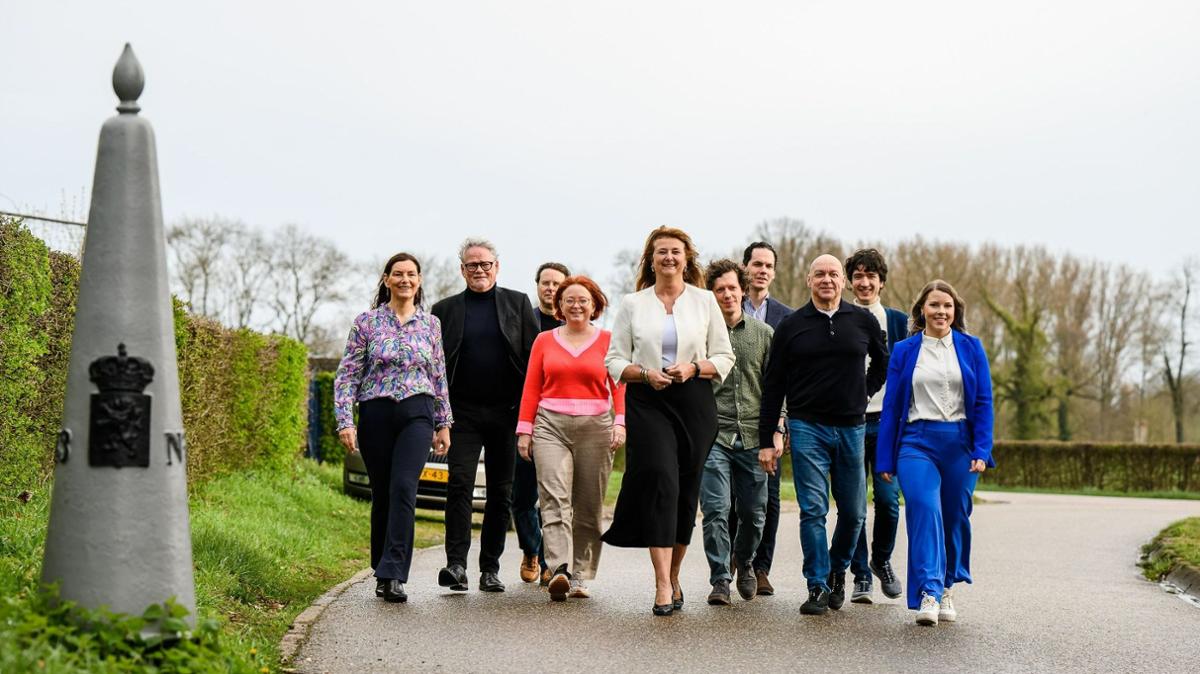 |
| Foreword |
| Dear reader,
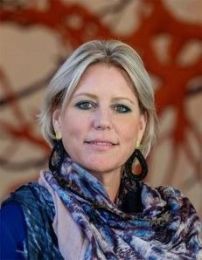
On the eve of the recent European Parliament elections, Maastricht was once again the venue for vibrant debates on the future of Europe. The Studio Europa debate and ITEM round table discussions at the EIPA building brought European politicians back to the city where the Europe of the Regions was proclaimed in 1992. This setting holds symbolic significance, reminding us of what we collectively stand for in Europe.
Fortunately, the election results show that Europe-minded parties in the Netherlands continue to perform well. Moreover, at 47 percent, voter turnout was higher than in previous elections. This demonstrates Europe's continued relevance in society. However, the political landscape remains fluid, with noticeable shifts and a pull to the right following recent national elections.
For those of us dedicated to Europe's future, it is clear that much needs to be done. It is time to act, focusing on practical cooperation across different government levels to reach European citizens effectively. Maastricht University has long been a partner to various institutions of government at national, European, and global levels. Now, more than ever, we must bring our experience to bear and contribute to Europe's future.
As for the national political landscape, the new four-party coalition agreement will have significant implications for our border region. The announced budget cuts and changes to study migration policies are set to affect education, research and innovation. Here in Limburg province, we will continue collaborating with regional stakeholders to support the economic and social development of our border region. We feel that politicians should see a border region as more than just a Dutch province; it requires collaboration with our neighbouring countries. We are committed to strengthening our partnerships with Dutch ministries and authorities from neighbouring countries to tackle our joint challenges together.
Both scientifically and socially, we are actively collaborating with our Belgian and German neighbours. With the Belgian presidency of the European Commission prioritising European industrial policy and competitiveness, we see a vital opportunity to balance economic growth with social well-being through enhanced international cooperation. Since 2015, ITEM and Hasselt University have been working together to improve the impact of science on society in the border region. Recently, this collaboration has widened to include the Flemish and Dutch governments in an INTERREG Schakelpunt project for sustainable solutions to border obstacles, with a kick-off meeting scheduled for 4 September in Antwerp.
Two months later it’s time to celebrate ITEM's 10th anniversary. So join the ITEM Annual Conference, which will be held in Ghent on 22 November. Hosted by East Flanders Governor Carina van Cauter and supported by the Flemish Ministry of Chancellery and Foreign Affairs, the conference will focus on strengthening European competitiveness and transitioning from the Green Deal to the Industrial Deal. Let's work together for impact as ITEM contributes with its border impact methodology on critical raw materials, the Net Zero Industry Act, and Corporate Sustainability Due Diligence. Mark your calendars and join us in shaping the future together.
Rianne Letschert
President Maastricht University |
|
|
|
|
|
 |
| HNP/ITEM round table |
After recent regional and national elections in the Netherlands (March & November 2023), Belgium (June 9 2024) and the European elections (June 6-9 2024), a new political reality has emerged on several levels; the regions, the Netherlands and Belgium, the Benelux and the European Union.
In this fourth online HNP/ITEM round table, we want to discuss and interpret the results of these elections for the position of border regions in the context of the current global and European challenges, the increase in regional disparities and the rise of right-wing parties in recent elections.
What is to be expected in the new political reality on a national level and in the European Union? What are regional representatives and other involved stakeholders planning to do in a Europe of regions? Is the European approach to regions and border regions adequate with regard to legislation and regulations? |
|
|
|
|
|
| Guestcolumn by Auke van der Goot |
European elections and border regions
 It seems light years ago that our border regions were at the centre of attention. An unknown, new and highly contagious disease made its appearance. Corona or covid was in the air, and here they came: concrete blocks on the Belgian-Dutch border, German soldiers on the border with Luxembourg, and reproaches from Belgium to the Netherlands about our - from Belgium's point of view - far too lighthearted corona measures at the beginning of what would later be called a pandemic. Relatively quickly in that corona period, all kinds of practical solutions were found for frontier workers in the border regions, including in the field of social security and taxation. The Netherlands and Germany were definitely pioneers in that field. The European Commission also took initiatives to keep cross-border transport of goods going. It seems light years ago that our border regions were at the centre of attention. An unknown, new and highly contagious disease made its appearance. Corona or covid was in the air, and here they came: concrete blocks on the Belgian-Dutch border, German soldiers on the border with Luxembourg, and reproaches from Belgium to the Netherlands about our - from Belgium's point of view - far too lighthearted corona measures at the beginning of what would later be called a pandemic. Relatively quickly in that corona period, all kinds of practical solutions were found for frontier workers in the border regions, including in the field of social security and taxation. The Netherlands and Germany were definitely pioneers in that field. The European Commission also took initiatives to keep cross-border transport of goods going.
As the European Union often knows how to benefit from times of crisis, the same seemed to apply to our border regions during the corona crisis. Unfortunately, the solutions from that time appear to have evaporated again, especially where taxation of border workers is concerned. In addition, the UWV also knows how to misbehave in a borderlessly citizen-unfriendly way when it comes to benefits of disabled frontier workers, as reported by NOS on 13 June. Only in the field of social security did the EU manage to play its role in 2022-2023 and create a post-corona regulation that brought an acceptable solution for remote work by cross-border workers. The Netherlands and its two neighbours have declared that scheme applicable. For social security purposes, frontier workers can now work from home for half their time without negative border effects. But the Netherlands has not yet managed to adopt a similar arrangement for the tax payment of frontier workers: 34 days a year is the maximum. However, such a limited arrangement leads to unnecessary administrative burdens for employers and employees. It is no wonder, then, that many residents in our border regions have little desire to look for a job in Germany. This is detrimental to the border-regional labour market on both sides of the border. Equally, this is unfavourable for the economic growth of our border regions.
That is why it is important to explicitly see the 34-day arrangement with Germany as a first step. The arrangement does not apply yet, by the way. It is not in force until parliamentary approval is sealed in both countries. It would be good if, in this respect, the Netherlands and Germany also made an agreement along the lines of a recent agreement between Luxembourg and France: there, the 34-day rule is explicitly regarded as temporary, with a legal obligation to evaluate the rule and adjust it if necessary (see a recent study carried out by ITEM p. 30).
However, these were not the issues at stake in the run-up to the European elections. It is tempting to philosophise at length about what the results mean for the future of Europe. Many media have already done so and I will not try to summarise and interpret that here. Is it a move to the right or will the political centre with the Christian democrats and social democrats as leading players sustain themselves as the traditional game changers in the EU? The future will tell and is uncertain. The stakes are high. The geopolitical and trade policy situation, the war around Ukraine, the desperate situation in Gaza, the climate, the migration problems and agrarian discontent. Europe has faced lesser challenges before.
Auke van der Goot
First MP for OPNL
Foto: Auke van der Goot © FNP |
|
|
|
|
|
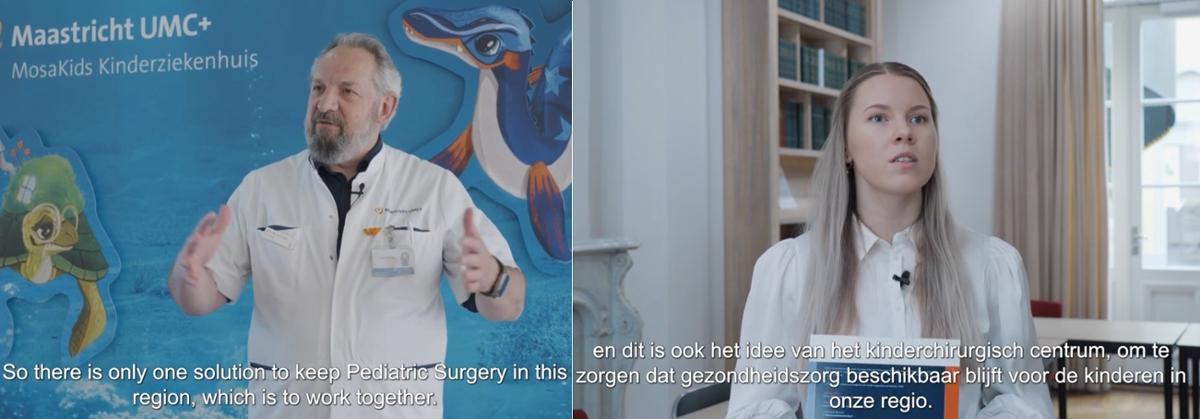 |
| Paving the way for a Euregional Centre for Paediatric Surgery |
Maastricht University and the university hospital MUMC+/azM will significantly strengthen and deepen their existing collaboration in the upcoming years. In this video, Prof. Wim van Gemert (MUMC+/azM) and ITEM researcher Susanne Sivonen explain the importance of this collaboration in context of the 'Euregional Center for Pediatric Surgery' and the work of ITEM.
Paediatric surgery is a highly specialised field that requires extensive education and training. However, European research has shown that there are relatively few paediatric surgical centers in the Netherlands and Belgium compared to other European countries such as Germany. The Netherlands has a number of large paediatric surgical centers spread throughout the country, but in the south of the country such a facility is lacking to a certain extent. In practice, this means that children in the Euregio Meuse-Rhine that are in need of a surgical procedure often have to travel in order to receive treatment, far away from their homes and families. Against this background, the partner hospitals are working together to provide high quality and future-proof paediatric surgical care in the Euregio Meuse-Rhine with the support of ITEM. |
|
|
|
|
|
 |
| Sander Kramer published in Maandblad Belasting Beschouwingen |
| In this contribution, Sander Kramer discusses the long-awaited judgments of the Court of Justice EU in the infraction proceedings initiated by the European Commission against the Netherlands. Briefly, the Court concludes that the requirements imposed by the Netherlands on a tax-free (individual) value transfer of pension entitlements are contrary to the free movement of workers. These requirements concern, on the one hand, the prohibition on surrender (proceedings C-360/22); on the other hand, the requirement of acceptance of liability and to provide security by the foreign pension institution, or the employee himself, for the collection of Dutch wage tax (proceedings C-459/22). In the article in question, the author discusses the two rulings in detail, places them against the background of the case law of the CJEU and considers to what extent these rulings help in the further realisation of a European single market for cross-border pensions. |
|
|
|
|
|
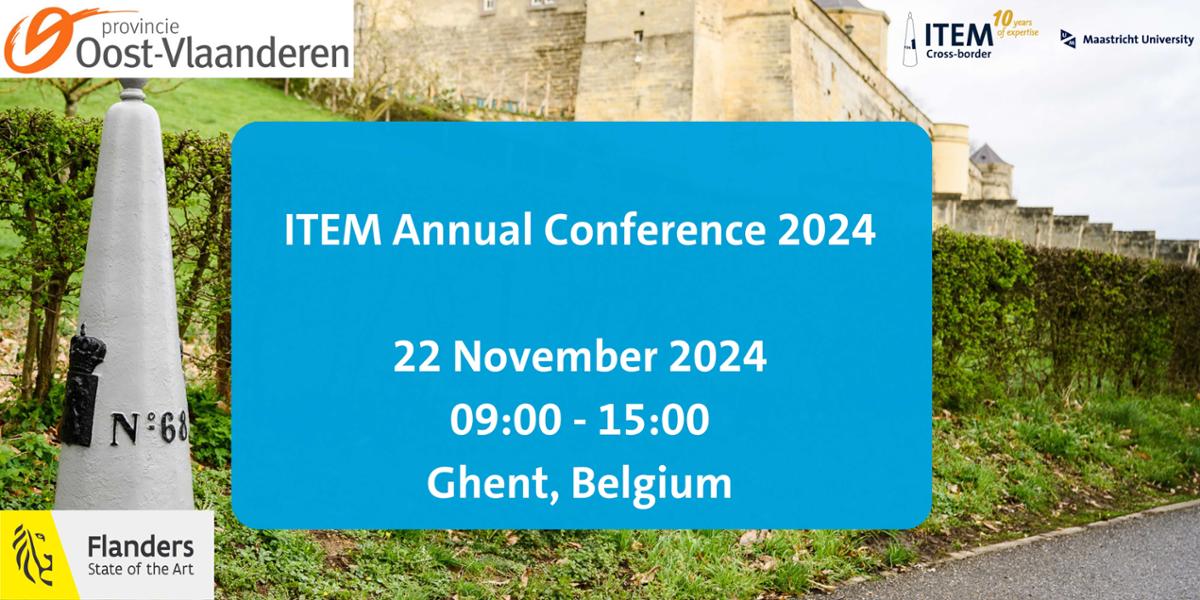 |
ITEM Annual Conference 2024
in cooperation with the Province of East Flanders
From green deal to industrial deal - decline "border blindness" & experience the living labs of European integration |
Friday 22 November 2024 | 09.00 - 15.00 hours
Leopoldskazerne, Ghent
North Western Europe has traditionally been at the forefront of innovation, industrialisation and making European society more sustainable. That Europe is as strong as its weakest link is also a given. Europe requires strengthening good cooperation between member states with cooperation and support from national, regional administrators and stakeholders, where Europe's internal borders are not perceived as obstacles but as opportunities. Current European and national elections show that although European citizens aspire to a sustainable and liveable society, the preconditions for this are certainly not yet sufficiently in place.
Cross-border objectives on sustainability and industry, economy, infrastructure and mobility also means active commitment to cross-border cooperation between member states. In the first half of this year, the Belgian Presidency of the European Council included strengthening Europe's competitiveness as one of its priorities. Supported by the outcome of the elections, the movement from a Green Deal to Industrial Deal has begun. In order to achieve a good investment climate with consistent laws and regulations and fair tariffs in a level playing field in the areas of sustainability, economic development and liveability, cross-border cooperation between different layers of government was mentioned as a prerequisite. Well-functioning European sustainable transport corridors are the essential required network in this respect. Within corridors are sub-regions that occupy key positions and act across borders. From the Benelux, the Dutch-Flemish cooperation initiating a linking mechanism, ITEM presents in this 10e edition of the annual conference the usefulness of the European border effects test and cohesion policy for border regions, the importance of European direction on cross-border cooperation and the effect of European industrial policy on border regions.
The experiences of 10 years of ITEM underline that cross-border cooperation on European societal challenges is crucial. Experience also shows that a structural, synergetic and long-term approach is necessary for effective results. In short, a broad integral vision of the future is needed with a place for short-term results as well. This requires a joint approach in which the various layers of government, knowledge institutions as well as stakeholders from the business community each have to contribute from their own responsibility.
The following ' ITEM Border impact cases will be covered in the programme:
- Opportunity analysis: European border impact assessment and cohesion policy for border regions
- Border Impact File: Facilitating Cross-border Solutions - proposed EU regulation
- Border Impact File: The impact of recent EU industrial policy legislation on border regions
Governor Carina van Cauter and the province of East Flanders are hosting the ITEM Annual Conference 2024 from the province of East Flanders. It will take place at the Provincial House in Ghent (Leopoldskazerne). The ITEM Annual Conference is co-sponsored by the Chancellery and Foreign Affairs Department (DKBUZA) of the Flemish government and the province of East Flanders.
We hope to see you in person in Ghent on 22 November.
Register now via the link below. You will receive the invitation with the full programme after the summer break.
Sincerely,
Prof. Dr. Anouk Bollen-Vandenboorn, Director ITEM and
Governor Carina van Cauter - Province of East Flanders
|
|
|
|
|
|
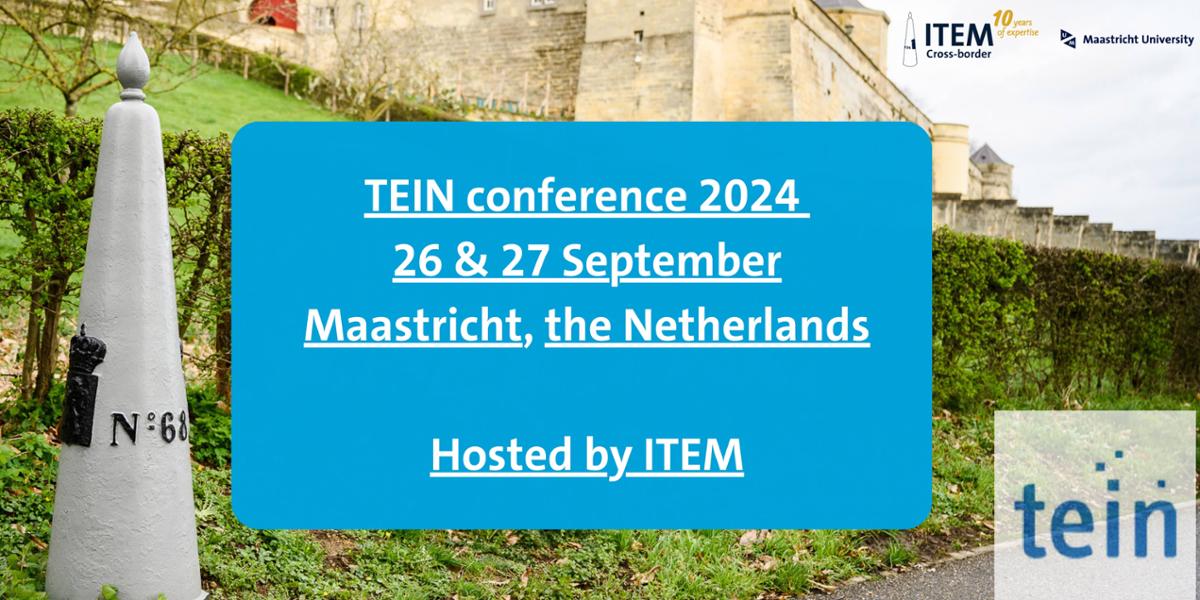 |
| TEIN Conference 2024 – hosted by ITEM |
Updated programme!
This 2-day conference addresses the practical challenges and prospects of future cross-border cooperation and mobility and advances debates and policy outlooks around and beyond the concept of horizontal integration. This event will be co-organised with TEIN, the European network of knowledge institutes dedicated to researching, training and counselling for better functioning cross-border regions in Europe.
Crossing the border daily is part and parcel of the life of millions of Europeans. Whether traveling for work, to study, to shop, or for leisure, inhabitants of border regions regularly go back and forth between one country and another. In our cross-border mobility we experience not only the pleasures of the EU’s freedom to travel, but in many ways also still face administrative and cooperative limits, and problematic differences in social security, taxation, health systems, diploma recognition, crime control, cross-border entrepreneurship, studying, sustainability, energy transformation etc.
Since Maastricht 1992 we have come a long way in fostering cooperation and mobility in cross-border regions, but cross-border cooperation and mobility is easier said than done. We haven’t (yet) cleared all technical, legislative, and cultural obstacles for a borderless process of European integration. How can we move forward to the next level of European integration in cross-border regions? Which innovations in cross-border governance mechanisms do we need? |
|
|
|
|
|
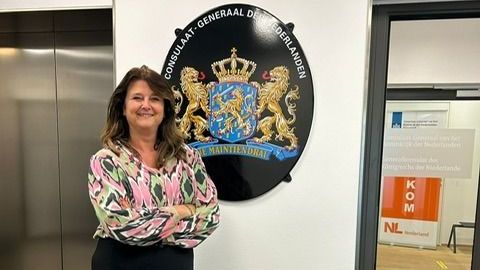 |
| On the 27th of May, ITEM director Prof. Dr. Anouk Bollen-Vandenboorn visited Hannah Tijmes, Consul-General of the Kingdom of the Netherlands in Düsseldorf |
In the presence of Jamie Reynders, senior policy officer for cross-border cooperation at the Consulate Düsseldorf and Jacqueline de Groot strategic advisor at ITEM, the introductory meeting discussed strengthening mutual cooperation and synergy in the field of cross-border cooperation. ITEM can play an enhanced supporting role in the German - Belgian - Dutch region through its way of working.
The conversation recognises "North - West - Europe" as an interesting area to explore a joint position in. How can enhanced cross-border cooperation be realised and what can we be of service to each other? The importance of structural information exchange in areas such as mobility, border labour, health, taxation, energy transition and environment (circularity) was discussed. The way in which joint coordination can take place on the deployment of the ITEM instrument "Horizontal Integration" was also discussed. This involves cooperation between different strata; ministers, administrators, governments etc across borders.
The positive ambience both in The Hague and also in NRW to actively work together has been named. Changes in political terms are always difficult, but by bringing more long-term trajectories into the picture, this can be anticipated. The "ITEM border effects agenda 2024" was offered. ITEM thus provides objective knowledge and solution options for border issues at dossier level. Furthermore, visualising cross-border consequences is important when tackling national tasks that transcend borders. |
|
|
|
|
|
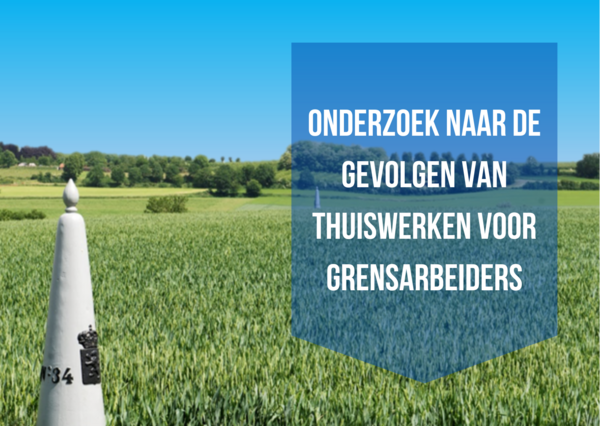 |
| Onderzoek naar de gevolgen van thuiswerken voor grensarbeiders |
ITEM verricht o.a. onderzoek naar de gevolgen van thuiswerken voor grensarbeiders, zowel ten aanzien van de fiscaliteit als de sociale zekerheid. De onderstaande vragen strekken ertoe inzichtelijk te maken welke knelpunten/belemmeringen– door werkgevers – worden ervaren op het gebied van thuiswerken door grensarbeiders. Deze input zal worden meegenomen in een stakeholdersoverleg bij het Ministerie van Financiën. De gegeven antwoorden zullen uiteraard vertrouwelijk worden behandeld.
1. Hoeveel van uw werknemers (zowel absolute aantal als % van totale werknemers) is grensoverschrijdend werkzaam (woonachtig in een ander land dan alwaar ze werkzaam zijn)? Hoeveel van deze grenswerkers werkt regelmatig (tussen de 25% en 50% van de totale werktijd) thuis? Ook graag benoemen in zowel absolute aantal als % van totale werknemers.
2. Wat zijn uw ervaringen – als werkgever – ten aanzien van thuiswerken door grenswerkers, bijv. administratieve lasten, compliant zijn met wet- en regelgeving, onzekerheid in (de toepassing van) wetgeving?
3. Wat zijn de ervaringen onder uw werknemers t.a.v. thuiswerken door grensarbeiders? Bijv. belastingaangifte doen in meerdere landen, gevolgen voor het netto-inkomen?
4. Bent u als werkgever bekend met de Kaderovereenkomst voor de sociale zekerheid? (Deze kaderovereenkomst is gemaakt met het oog op het beperken van de effecten van grensoverschrijdend werken op de toepasselijke socialezekerheidswetgeving. De kaders die hierin zijn opgenomen maken het voor grensarbeiders mogelijk om onder voorwaarden sociaal verzekerd te blijven in hun werkland, bijvoorbeeld Nederland.) Zo ja, maakt u hier gebruik van? Maakt u hier geen gebruik van, licht graag kort toe waarom niet.
5. Wat zouden uw aanbevelingen zijn om thuiswerken door grenswerkers voor u als werkgever, en voor uw werknemers, makkelijker te maken?
We danken u voor uw aandacht en betrokkenheid en zien uw reactie graag voor 1 juli tegemoet. U kunt uw antwoorden toesturen naar ITEM@maastrichtuniversity.nl.
|
|
|
|
|
|
|
| 
|
| ITEM in the media and contributions |
|
ITEM participated in the EGTS Linieland van Waas and Hulst workshop 'launching uniform(er) internship contracts'. This workshop kicked off the crossborder job fair on 23 April in Beveren. In the border area of Zeeuws-Vlaanderen and northern East Flanders, with Port of Antwerp-Bruges and North Sea Port as economically relevant poles of attraction, crossborder internships offer valuable opportunities for young people. Unfortunately, this remains complex due to differences in social security, taxes and internship contracts. It does not always provide crossborder opportunities. Thanks to B-solutions 2.0 AEBR, we are tackling these obstacles. Can we already start with more uniform internship contracts? ITEM researcher Sander Kramer presented the findings as part of the b-solutions 2.0 project. Several interested parties from business, education and government participated in the workshop.
|
|
On 17 May Sander Kramer took the stage at the renowned IBFD Academic Tax Conference in Amsterdam. Sander's presentation, “The CJEU's and the European Commission's Role in Reconciling Article 18 with the Different Approaches to Taxing Pensions: Measures Falling Short in a Globalising World?”, shed light on how these European bodies are tackling this issue and pointed out if current measures are falling short in our rapidly globalizing world.
|
|
Martin Unfried was a guest on L1’s De Stemming interview programme on Saturday 19 May. The topic of discussion was the European Parliament elections on 6 June 2024. Read more here.
|
|
The symposium 'SMEs in the Belgian-Dutch border region' took place in Nijmegen on 23 May 2024. A symposium organised by ITEM in cooperation with Radboud University, UHasselt and UGent. During the symposium, various current tax developments were discussed, both from a Dutch and Belgian perspective. Bastiaan Didden, a researcher at ITEM, delivered a lecture on the topic of 'permanent establishment' during the symposium.
|
|
On Monday 3rd June 2024, Dorien Coppens (former ITEM researcher) presented the EMRlingua project at the workshop "Facilitating European Mobility of Foreign Language Teachers" organised by the Goethe-Institut Brussels.
|
|
On the 4th of June Martin Unfried's column 'Besser als ihr Ruf' was published in the Tageszeitung Berlin. In this column, he challenges the typical portrayal of the EU in German media and criticises the superficial EU election coverage in Germany and calls for deeper engagement with EU politics.
|
|
Martin Unfried was invited to an online panel on the EU elections at Berlin newspaper die Tageszeitung. Watch the Taz Talk here.
|
|
Martin Unfried attended the annual external workshop of the Network of Regional Hubs in beautiful Cologne, Germany, on 6-7 June 2024, hosted by the North Rhine-Westphalia Hub. He led an interactive session on stakeholder engagement. Read more here.
|
|
On 17 June, Martin Unfried and ITEM Director Prof. dr. Anouk Bollen-Vandenboorn participated in the conference "Working Across Borders: Towards a fair 360-degree labour market in the Dutch-German cross-border region" in Osnabrück.
|
|
On 24 June, contributions by Martin Unfried to the Sphinx-debate on the European elections were published in newspaper De Limburger. Read the article here.
|
|
Find the latest publications by the ITEM team here.
|
| |
|
|
|
|
|
|